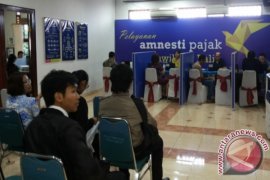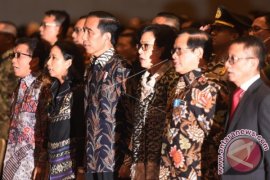Jakarta (Antara Bali) - Tax amnesty policy would be beneficial to the state in long term, although in short term the policy cuts potential revenues, a law expert said.
Constitutional Law professor from the Andalas University Saldi Isra said the amnesty would cut potential revenues in short term but in long term the policy would be beneficial.
Saldi was speaking as an expert witness representing the government in a hearing at a Constitution Court session on a case filed by certain organizations and individuals opposing the tax amnesty program.
Those filing the case Serikat Perjuangan Rakyat Indonesia, Yayasan Satu Keadilan, three labor unions and an individual named Leni Indrawati, said the Law No. 11 of 2016 on tax amnesty program is discriminating, accusing the government of protecting those failing to pay obligation in the past.
They asked the Constitutional Court to declare the Law No. 11 of 2016 against the state Constitution.
Saldi said even without tax amnesty the government it does not necessarily mean the government would earn an additional income in taxes from those failing to pay their tax obligations in the past.
Tax amnesty also would contribute to the country's economic development and would open new jobs , he said.
He said there is a long term goal to be brought to reality through the tax amnesty program that is to reform the country's taxation system by expanding data base of tax payers.
"With the program, the government would certainly has additional sources of income from the tax sector, from tax payers that take part in the program," he said.
There is strong reason to say that the law brought two principles to one points - legal certainty and benefits, he added.
He said the regulations of the tax amnesty law gave clear regulations for the tax payers, who had problem in tax reporting in the past .
"With the law they see certainty and the state gains from the policy," he said.
Earlier former finance minister Chatib Basri said small entrepreneurs dominate the number of those taking part in the government's program of tax amnesty.
"Individual taxpayers or business people with assets of up to Rp1 billion are the ones to gain more from the tax amnesty program. Not the big ones," Chatib, an economist expert representing the government, told the Constitutional Court in previous session on the same case.
Chatib said most of the tax payers paying the penalty (redemption) under the tax amnesty program are small entrepreneurs with small assets.
The largest in number of tax payers taking part in the program are those paying a penalty from Rp10 million to Rp99 million each, he said, adding there are 129,513 of them.
Those in the group that paid Rp10 million in penalty have assets up to Rp1 billion each , he said.
"They certainly are not very rich people," he said.
Those with assets worth more than Rp100 billion are only 32 in number , and those with assets from Rp50 billion to Rp100 billion were 71 persons.
Small entrepreneurs with assets of up to Rp10 billion are required only to pay a penalty of 0.5 percent and those with assets of more than Rp10 billion are to pay a penalty of 2 percent . The penalty rate is the same in all three phases of the tax amnesty program.
The program is made in three phases - the first from July to September, the second from October to December and the third or the last from January to March 2017.
Big or rich tax payers are required to pay a penalty of 2 percent in the first phase, 3 percent in the second phase and 5 percent in the last phase.
Unexpected by analysts and observers, the government earned a penalty of Rp97.2 trillion in the first phase or more than 50 percent of the target of Rp165 trillion set until March 2017.
Assets declared were valued at Rp3,500 trillion that would significantly contribute to the tax revenues in the coming years.
Repatriation, however, reached only Rp137 trillion still much below the target of Rp1,000 trillion.
Many rich Indonesian parked their money abroad either for commercial gain or merely to evade tax.
In 2018, Indonesia is to adopt the automatic exchange of information (AEOI) with all bank accounts in the world accessible to investigation of taxable assets giving little room for tax evasion. (WDY)




